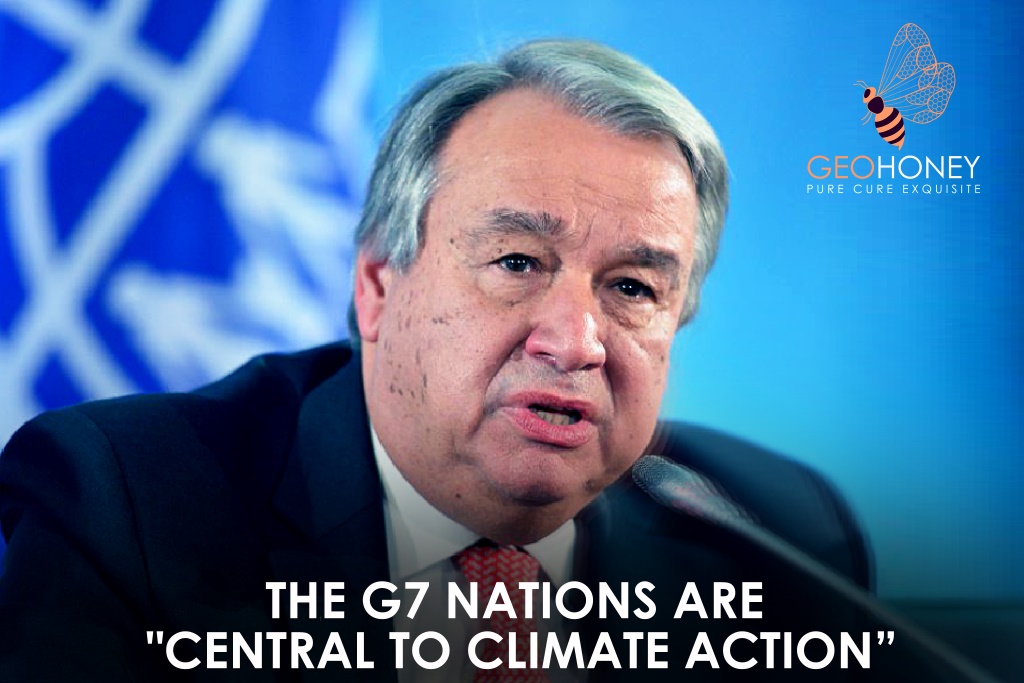- Tokyo: 12:16
- Singapore: 11:16
- Dubai: 07:16
- London: 03:16
- New York: 22:16
According to Guterres, the G7 Nations are "Central to Climate Action”

The world is counting on the G7 bloc of industrialised democracies to show global leadership and solidarity, said the UN Secretary-General on Sunday in Hiroshima, Japan, which he described as a "global symbol of the tragic consequences when nations fail to work together" and abandon multilateralism.
The G7, composed of Canada, France, Germany, Italy, Japan, the United Kingdom, and the United States, is meeting in the city where the first atomic bomb was dropped in 1945, a location described as a "testament to the human spirit" by Secretary-General António Guterres.
"Whenever I visit, I am inspired by the Hibakusha's courage and resilience," he remarked, referring to the survivors of that heinous crime of war. "The United Nations supports them. We shall never relent in our efforts to achieve a world free of nuclear weapons."
"While the economic picture is uncertain everywhere," Mr. Guterres said, "rich countries cannot ignore the fact that more than half the world - the vast majority of countries - are suffering through a deep financial crisis."
He underlined his earlier statement, made on an official visit to Jamaica last week, that the difficulties confronting developing countries had three dimensions: moral, power-related, and practical.
The UN Secretary-General elaborated on the "systemic and unjust bias" in the global economic and financial system, the "outdatedness of the global financial architecture," and the fact that developing economies had been left down and sold short even under the current laws, saying the G7 had a duty now to act.
He claimed that the financial system established after WWII's Breton Woods realignment had simply "failed to fulfil its core function as a global safety net" in the face of COVID economic shocks and Russia's invasion of Ukraine.
He stated that the moment had arrived to repair the Bretton Woods system and overhaul the United Nations Security Council.
"This is essentially a question of redistributing power in accordance with today's realities."
"In our multipolar world, as geopolitical divisions grow, no country or group of countries can stand by as billions of people struggle with the basics of food, water, education, healthcare, and jobs," he said.
He emphasised the key areas where the world's richest were critical to the success of climate action, emphasising the dangers of ignoring the rate of climate change.
According to the latest data from the UN meteorological agency, WMO, the next five years are set to be the hottest ever, with humanity on track for a 2.8°C temperature rise by the end of the century.
He stated that the G7, with its enormous economic and financial influence, is "central to climate action," which is "working, but not enough, and we are clearly off track."
"With our Acceleration Agenda, we hope to make up for lost time." It urges all G7 countries to achieve net zero emissions as soon as practicable after 2040, and rising economies to do so as soon as possible after 2050."
A Climate Solidarity Pact calls on the G7 to mobilise resources to assist less developed economies in speeding decarbonization in order to stay within the 1.5° Celsius limit on heating compared to pre-industrial levels.
Coal Should Be Phased Out
"This necessitates shorter timelines for phasing out fossil fuels and ramping up renewables." It entails setting a price on carbon and abolishing subsidies for fossil fuels. "I urge the G7 to phase out coal completely by 2030," stated the UN Secretary-General.
But he also called for climate justice on behalf of the countries who contributed the least to the issue but are suffering the most.
"We must increase adaptation and early warning systems to assist front-line populations..."It is past time for developed countries to contribute the promised $100 billion per year," he continued.
He also stated that the Loss and Damage Fund established at COP27 last year in Sharm el-Sheikh "must be operationalized."
Source: news.un.org




While the economic picture is uncertain everywhere, rich countries can not ignore the fact that more than half the world, the vast majority of countries are suffering through a deep financial crisis.